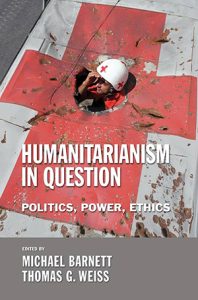Humanitarianism in Question: Politics, Power, Ethics

Editor(s): Michael Barnett & Thomas G. Weiss
Publisher: Cornell University Press
Year of Publication: 2008
Print Length: 320 pages
Genre: Non-Fiction / Social Science
Topic: Humanitarian Action & Humanitarianism, Humanity, Ethics & Morality, Politics & Power, History, Human Rights, Democracy, Peace, Development, Governance, Charity, Philanthropy, Organization, Non-Profit Organization (NGO), Accountability, Suffering, Sacrifice, Hostage, Capitalism, Neoliberalism, Scholarship & Knowledge, Research
Years of tremendous growth in response to complex emergencies have left a mark on the humanitarian sector. Various matters that once seemed settled are now subjects of intense debate. What is humanitarianism? Is it limited to the provision of relief to victims of conflict, or does it include broader objectives such as human rights, democracy promotion, development, and peacebuilding? For much of the last century, the principles of humanitarianism were guided by neutrality, impartiality, and independence. More recently, some humanitarian organizations have begun to relax these tenets. The recognition that humanitarian action can lead to negative consequences has forced humanitarian organizations to measure their effectiveness, to reflect on their ethical positions, and to consider not only the values that motivate their actions but also the consequences of those actions.
In the indispensable Humanitarianism in Question, Michael Barnett and Thomas G. Weiss bring together scholars from a variety of disciplines to address the humanitarian identity crisis, including humanitarianism’s relationship to accountability, great powers, privatization and corporate philanthropy, warlords, and the ethical evaluations that inform life-and-death decision making during and after emergencies.
Table of Contents
Acknowledgments
List of Abbreviations
1. Humanitarianism: A Brief History of the Present — Michael Barnett & Thomas G. Weiss
2. The Rise of Emergency Relief Aid — James D. Fearon
3. The Imperative to Reduce Suffering: Charity, Progress, and Emergencies in the Field of Humanitarian Action — Craig Calhoun
4. Saying “No” to Wal-Mart? Money and Morality in Professional Humanitarianism — Stephen Hopgood
5. Humanitarian Organizations: Accountable—Why, to Whom, for What, and How? — Janice Gross Stein
6. The Grand Strategies of Humanitarianism —Michael Barnett & Jack Snyder
7. The Power of Holding Humanitarianism Hostage and the Myth of Protective Principles — Laura Hammond
8. Sacrifice, Triage, and Global Humanitarianism — Peter Redfield
9. The Distributive Commitments of International NGOs — Jennifer C. Rubenstein
10. Humanitarianism as a Scholarly Vocation — Michael Barnett
11. Humanitarianism and Practitioners: Social Science Matters — Peter J. Hoffman & Thomas G. Weiss
Contributors
Index

Michael Barnett is University Professor of International Affairs and Political Science at the George Washington University. His research interests span the Middle East, humanitarianism, global governance, global ethics, and the United Nations. Among his many books are Eyewitness to a Genocide: The United Nations and Rwanda; Dialogues in Arab Politics: Negotiations in Regional Order; Empire of Humanity: A History of Humanitarianism; Rules for the World: International Organizations in World Politics (with Martha Finnemore); Security Communities (co-edited with Emanuel Adler); Sacred Aid (co-edited with Janice Stein); Power and Global Governance (co-edited with Raymond Duvall); and Humanitarianism in Question (co-edited with Thomas Weiss). His current research projects include an edited volume and the changing forms of global governance (to be published by Cambridge University Press), hierarchies in humanitarian governance; the end of the two state-solution and the rise of the one-state reality in Israel/Palestine; and the relationship between suffering and progress in the liberal international order.
Source: https://elliott.gwu.edu/michael-barnett
More from Michael Barnett in this library, click here.

Thomas G. Weiss is a distinguished scholar of international relations and global governance with special expertise in the politics of the United Nations. Since 1998 he has been Presidential Professor at The Graduate Center, CUNY (The City University of New York), and is Director Emeritus of the Ralph Bunche Institute for International Studies. He is also Co-Chair, Cultural Heritage at Risk Project, J. Paul Getty Trust; Distinguished Fellow, Global Governance, The Chicago Council on Global Affairs; and Global Eminence Scholar, Kyung Hee University, Korea. He is “one of the leading experts on the theory and practice of humanitarian intervention,” and is recognized as an authority on international organizations and the United Nations system. Weiss adheres to the constructivist school, and advocates a position for intergovernmental organizations that goes beyond the anarchy of inter-state relations.
Source: https://www.gc.cuny.edu/people/thomas-g-weiss
More from Thomas G. Weiss in this library, click here.
